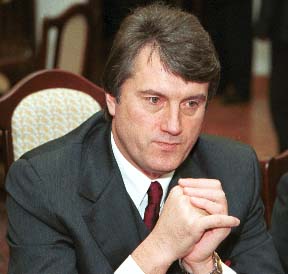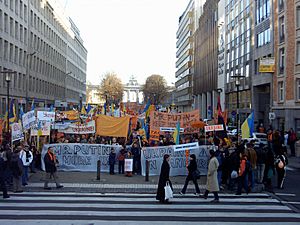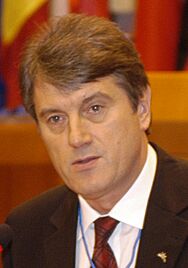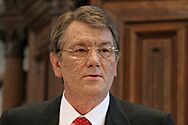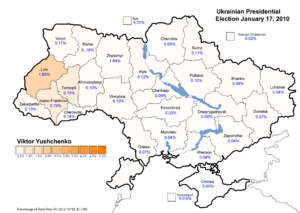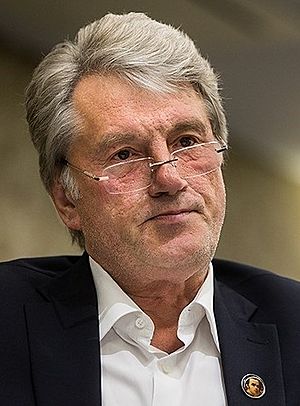Viktor Yushchenko facts for kids
Quick facts for kids
Viktor Yushchenko
|
|
|---|---|
|
Віктор Ющенко
|
|
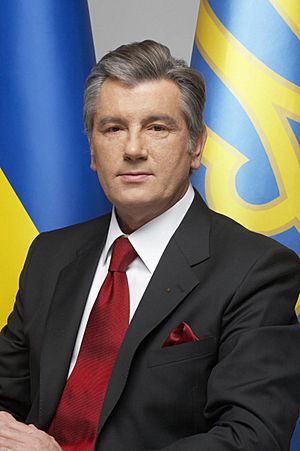
Official portrait, 2008
|
|
| 3rd President of Ukraine | |
| In office 23 January 2005 – 25 February 2010 |
|
| Prime Minister |
|
| Preceded by | Leonid Kuchma |
| Succeeded by | Viktor Yanukovych |
| 7th Prime Minister of Ukraine | |
| In office 22 December 1999 – 29 May 2001 |
|
| President | Leonid Kuchma |
| Deputy | Yuriy Yekhanurov |
| Preceded by | Valeriy Pustovoitenko |
| Succeeded by | Anatoliy Kinakh |
| Governor of the National Bank of Ukraine | |
| In office January 1993 – 22 December 1999 |
|
| Preceded by | Vadym Hetman |
| Succeeded by | Volodymyr Stelmakh |
| People's Deputy of Ukraine | |
| In office 14 May 2002 – 23 January 2005 |
|
| Constituency | Our Ukraine Bloc, No. 1 |
| Personal details | |
| Born | 23 February 1954 Khoruzhivka, Sumy Oblast, Soviet Union |
| Political party |
|
| Other political affiliations |
Communist Party of Ukraine (1980–1991) Independent (1991–2002, 2004–2005) |
| Spouses |
|
| Children | 5 |
| Alma mater |
|
| Signature | |
| Military service | |
| Allegiance | Soviet Union |
| Branch/service | Soviet Border Troops |
| Years of service | 1975–1976 |
| Rank | Captain |
Viktor Yushchenko is a Ukrainian politician. He served as the third President of Ukraine from January 23, 2005, to February 25, 2010. He wanted Ukraine to become closer to Western countries. This included joining groups like the European Union and NATO.
Before becoming president, Yushchenko worked in banking. In 1993, he became the head of Ukraine's main bank, the National Bank of Ukraine. He helped control very high inflation and introduced Ukraine's own money, the Ukrainian hryvnia. From 1999 to 2001, he was the Prime Minister of Ukraine.
After being dismissed as prime minister, Yushchenko became a leader of the opposition. He started a political group called "Our Ukraine Bloc". This group became very popular in the 2002 parliamentary election.
In the 2004 presidential election, Yushchenko was a main candidate. His opponent was Prime Minister Viktor Yanukovych. During the election campaign, Yushchenko was poisoned. He survived, but his face was changed. The election results were questioned due to fraud. This led to the Orange Revolution. Ukraine's highest court ordered a new vote. Yushchenko won this second vote.
After becoming president, Yushchenko's influence decreased. He had disagreements with his prime minister, Yulia Tymoshenko. His popularity also went down. His presidency was marked by political disagreements and crises. He lost the 2010 presidential election, finishing in fifth place.
Contents
Early Life and Education
Viktor Yushchenko was born on February 23, 1954. His birthplace was Khoruzhivka, a village in the Sumy Oblast region of Ukraine. At that time, Ukraine was part of the Soviet Union. His parents were both teachers.
His father, Andriy Yushchenko, fought in World War II. He was captured by German forces and held in concentration camps. He survived and later taught English. Viktor's mother, Varvara Yushchenko, taught physics and mathematics.
Yushchenko grew up speaking Ukrainian. This was different from many other politicians who spoke Russian. In 1975, he graduated from the Ternopil National Economic University. He then worked as an accountant. From 1975 to 1976, he served in the Soviet army near the Turkish border.
Career in Banking
In 1976, Yushchenko started his career in banking. By 1983, he was a deputy director at a state bank. From 1990 to 1993, he worked as a vice-chairman at a large agricultural bank.
In 1993, he was chosen to be the Governor of the National Bank of Ukraine. This is Ukraine's central bank. He was re-appointed to this role in 1997.
As the head of the central bank, Yushchenko played a key role. He helped create Ukraine's national currency, the Ukrainian hryvnia. He also set up a modern system for commercial banks. He successfully brought down very high inflation. Inflation dropped from over 10,000 percent to less than 10 percent. He also protected the value of the currency after the 1998 Russian financial crisis.
In 1998, he earned a doctorate in economics. He wrote a paper about money supply and demand in Ukraine.
Becoming Prime Minister
In December 1999, Ukrainian President Leonid Kuchma chose Yushchenko as the new prime minister. Ukraine's economy improved while Yushchenko was prime minister.
However, his government faced problems. There were conflicts with powerful leaders in the coal mining and natural gas industries. This led to a vote in parliament on April 26, 2001. The parliament voted to remove Yushchenko from office.
Leader of "Our Ukraine"
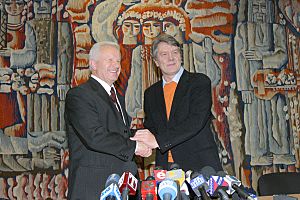
After leaving the prime minister's office, Yushchenko became a political leader. In 2002, he became the head of the "Our Ukraine" political group. This group won the most seats in the 2002 parliamentary election. However, they did not win enough seats to form a majority government.
Yushchenko remained the public face of the Our Ukraine group. He worked with other opposition leaders. In 2004, Our Ukraine and the Yulia Tymoshenko Bloc formed a group called "Force of the People". Their goal was to challenge the government. Yushchenko promised to make Tymoshenko prime minister if he won the 2004 presidential election.
Yushchenko was seen as a moderate leader of the opposition. His popularity was higher than President Kuchma's for a while. After becoming president in 2005, he became an honorary leader of the Our Ukraine party.
The 2004 Presidential Election
In 2004, Yushchenko ran for president as an independent candidate. His main opponent was Prime Minister Viktor Yanukovych. Yushchenko focused on meeting voters face-to-face. This was because major TV channels did not give equal coverage to all candidates.
Yushchenko's campaign focused on ideas like joining Europe and NATO. He also wanted to fight corruption.
Poisoning Incident
In September 2004, Yushchenko became very ill. He was flown to a clinic in Vienna for treatment. Doctors found he had a serious illness caused by a viral infection and unusual chemicals. Yushchenko believed he was poisoned by government agents. After his illness, his face showed signs of chloracne. This is a skin condition caused by dioxin poisoning.
Doctors confirmed that Yushchenko had been poisoned with a very high level of TCDD dioxin. The levels in his blood were thousands of times higher than normal. Many people linked the poisoning to a dinner he had with Ukrainian officials on September 5.
Later studies showed the dioxin was very pure. This suggested it was made in a laboratory. Yushchenko believed some people who were at the dinner were involved. He said these people were in Russia. Ukrainian prosecutors stated Russia refused to send one of them back to Ukraine.
Presidency of Ukraine
Inauguration and Early Days
Viktor Yushchenko became the President of Ukraine on January 23, 2005. Many foreign leaders attended his inauguration ceremony.
In his first hundred days, Yushchenko made many changes. He appointed Yulia Tymoshenko as prime minister. He also appointed other key officials. In May 2005, Ukraine hosted the Eurovision Song Contest in Kyiv.
In August 2005, Yushchenko signed the Borjomi Declaration with the Georgian President. This called for a group of democracies around the Baltic, Black, and Caspian Seas.
Changes in Government
On September 8, 2005, Yushchenko dismissed his government. This included Prime Minister Tymoshenko. There were claims of corruption. The next day, a new acting prime minister, Yuriy Yekhanurov, tried to form a new government. Parliament approved his government on September 22.
In August 2006, Yushchenko appointed Viktor Yanukovych as the new prime minister. Yanukovych had been his opponent in the presidential race. This was seen as a step towards better relations with Russia.
Parliamentary Dissolutions
On April 2, 2007, Yushchenko ordered the parliament to be dissolved. He called for early elections. Some people thought this order was against the constitution. They argued that the conditions for the president to dissolve parliament were not met. The parliament appealed to the Constitutional Court.
In May 2007, Yushchenko dismissed three members of the Constitutional Court. This stopped the court from making a decision on his order.
Yushchenko tried to dissolve parliament again on October 9, 2008. He announced new elections for December 7. This decree was also challenged and later expired. Yushchenko said that political disagreements were ruining the democratic coalition.
Later Career and Elections
2010 Presidential Election
On November 10, 2009, Yushchenko was nominated for a second term as president. The election was held on January 17, 2010. He stated he would leave politics after a possible second term. He also said that Ukraine's independence was at risk.
In the first round of the election, Yushchenko finished in fifth place. He received only 5.45% of the votes. This was the lowest result for a sitting president.
Yushchenko did not support either of the two main candidates in the second round. He said Ukraine did not have a good choice. He did not attend the inauguration of the new president, Viktor Yanukovych.
After the Presidency
After his presidency, Yushchenko continued to be involved in politics. He testified in the trial of his former ally, Yulia Tymoshenko. This trial was about a natural gas agreement she made with Russia in 2009.
In September 2011, Yushchenko said he planned to run for parliament again. He led the Our Ukraine party list in the 2012 parliamentary elections. However, the party did not win enough votes to enter parliament.
In February 2013, Yushchenko said he intended to be a candidate in the next presidential election.
Euromaidan and 2014 Events
In March 2014, Yushchenko supported the Euromaidan protests. He was against the Russian military actions in Crimea. He stated that Russia's leader, Vladimir Putin, wanted to rebuild the Soviet empire. Yushchenko said that Crimea is Ukrainian.
He supported Vitali Klitschko in the 2014 presidential election. Yushchenko himself did not run.
Russian Invasion of Ukraine
In 2024, Yushchenko spoke about the delay in US military aid to Ukraine. He called it a "colossal waste of time." He said it allowed Russia to attack and ruin Ukraine's infrastructure. He supported President Volodymyr Zelenskyy's actions. He also opposed giving up territory to end the war. He believed it would only give Russia time to get stronger and attack again.
Political Views
Yushchenko is seen as a politician who looks to the West. He also supports Ukrainian national identity. He wants Ukraine to join Europe and NATO. He promotes free market reforms. He also works to preserve Ukrainian culture and history. This includes remembering the Holodomor, a famine in the 1930s.
His supporters say he is committed to teamwork and negotiation. His critics sometimes say he is indecisive. He is also often accused of not being able to keep a unified team.
Yushchenko supports Ukraine joining NATO. He is against making Russian the second official language in Ukraine. He believes that national unity is important for the country's future. He also wants to unite the different branches of the Orthodox Church in Ukraine.
Yushchenko has praised the actions of the Ukrainian Insurgent Army. He has tried to give anti-Soviet fighters from World War II veteran status.
He believes that difficulties between Ukraine and Russia are due to different values. He thinks the 2008 Russia-Georgia war was a threat that European leaders did not address. He has called for clear borders between Russia and Ukraine.
In his 2010 presidential election program, Yushchenko promised visa-free travel with the EU. He also wanted Russia's Black Sea Fleet to leave Ukraine by 2017. He aimed for good relations with all of Ukraine's neighbors.
On March 2, 2022, Yushchenko described Russia as a "fascist regime" after its invasion of Ukraine.
Family and Personal Life
In 1977, Yushchenko married Svitlana Ivanivna Kolesnyk. They had two children and three grandchildren. Later, he married Kateryna Yushchenko.
Yushchenko is a practicing member of the Ukrainian Orthodox Church. He often talks about how his religious beliefs are important to him.
He enjoys Ukrainian traditional culture. This includes art, ceramics, and archaeology. He also likes mountaineering and beekeeping. He collects antiques and Ukrainian national dress. Each year, he climbs Hoverla, Ukraine's highest mountain.
Honors and Awards
Yushchenko has received many honors and awards from different countries:
- Latvia: Commander Grand Cross with Chain of the Order of Three Stars (2006)
- Lithuania: Grand Cross with Golden Chain of the Order of Vytautas the Great (2006)
- Croatia: Knight Grand Cross of the Grand Order of King Tomislav (2007)
- Poland: Order of the White Eagle (2005) and Grand Cross of the Order of Polonia Restituta (2009)
- Ukraine: Order "For Merits" of Class III (1996)
- United States: The Liberty Medal (2005)
- Azerbaijan: Order of Heydar Aliyev (2008)
- Finland: Order of the White Rose of Finland (2006)
- Georgia: Order of the Golden Fleece (2009), St. George's Order of Victory (2009), and Presidential Order of Excellence (2011)
- Sweden: Royal Order of the Seraphim (2008)
- Hungary: Order of Merit of the Republic of Hungary (2008)
- Germany: Quadriga (2006)
He was named "Man of the Year 2004" by Wprost magazine. He was also included in the 2005 Time 100 list of the world's most influential people.
Yushchenko has received honorary doctorates from several universities. These include the National University of Kyiv-Mohyla Academy and the University of Maria Curie-Sklodowska.
Images for kids
See also
 In Spanish: Víktor Yúshchenko para niños
In Spanish: Víktor Yúshchenko para niños
 | John T. Biggers |
 | Thomas Blackshear |
 | Mark Bradford |
 | Beverly Buchanan |


